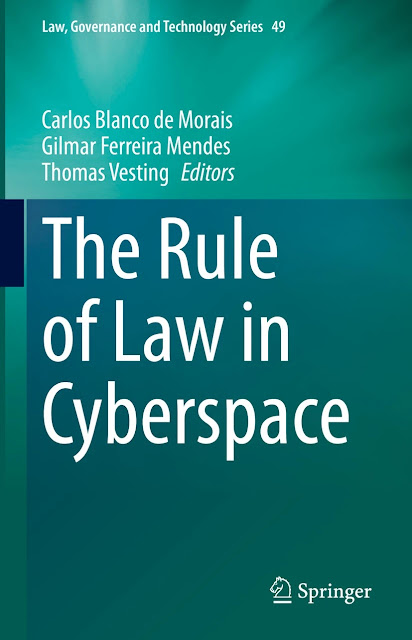Carlos BLANCO DE MORAIS, Gilmar FERREIRA MENDES, Thomas VESTING
The rule of law in cyberspace currently faces serious challenges. From the democratic system to the exercise of fundamental rights, the Internet has raised a host of new issues for classic legal institutions. This book provides a valuable contribution to the fields of international, constitutional and administrative law scholarship as the three interact in cyberspace.
The respective chapters cover topics such as the notion of digital States and digital sovereignty, jurisdiction over the Internet, e-government, and artificial intelligence. The authors are eminent scholars and international experts with a profound knowledge of these topics. Particular attention is paid to the areas of digital democracy, digital media and regulation of the digital world.
The approach employed is based on a comparative perspective from Germany, the Netherlands, Italy, Portugal and Brazil. One particular focus is on how various legal systems are coping with increasing difficulties in the exercise of democracy with regard to disinformation and hate speech. The roles of legislators, the judicial system and public administrations are analysed in the light of the latest cases, conflicts and technologies.
In addition to this comparative approach, the book explores the evolution of rule of law in cyberspace and the upcoming new legal regimes in the European Union and Brazil. Special care is taken to offer a critical review of both the literature and the latest legal solutions adopted and being considered regarding the regulation of cyberspace from a constitutional and administrative perspective.Given its scope, the book will be of interest to researchers and scholars in the field of digital law whose work involves constitutional problems in cyberspace and/or practical problems concerning the regulation of social networks and online commerce.
TABLE OF CONTENTS
Introduction
Carlos Blanco de Morais, Gilmar Ferreira Mendes, Thomas Vesting
PART I
DEMOCRATIC CONSTITUTIONALISM IN CYBERSPACE
Carlos Blanco de Morais, “Digital Democracy”: A Threat to the Democratic System or Oxygenation of Representative Democracy and Free Speech?
Gilmar Ferreira Mendes, Victor Oliveira Fernandes, Digital Constitutionalism and Constitutional Jurisdiction: A Research Agenda for the Brazilian Case
Francisco Balaguer Callejón, The Crisis of the Representative Democracy in the Face of Digital Democracy
José Levi Mello do Amaral Júnior, Rule of Law, Democracy and New Technologies
Paulo Uebel, Freedom, Democracy, Digital Government and Human Development
Sofia Ranchordás, The Digitization of Government and Digital Exclusion: Setting the Scene
Thomas Vesting, The Impact of Artificial Intelligence on the Structures of the Modern Public Sphere
THE THREAT OF DISINFORMATION AND THE ROLE OF SOCIAL NETWORKS
Frederico Gonçalves Junkert, Fake News and the 2018 Brazilian Presidential Election
Carlos Bastide Horbach, Political Speech, Freedom of Expression and Fake News
Luísa Meireles, Disinformation and Journalism
Mariana Melo Egídio, Social Networks and the Exercise of Fundamental Rights: Public Administration and the Digitalization of Fundamental Rights
Rui Tavares Lanceiro, Freedom of Expression in the Age of Digital Platforms: Change of Paradigm?
Ginevra Cerrina Feroni, Andrea Gatti, Online Hate Speech and the Role of Digital Platforms: What Are the Prospects for Freedom of Expression?
Miguel Nogueira de Brito, Hate Speech and Social Media
Clara Iglesias Keller, Don’t Shoot the Message: Regulating Disinformation Beyond Content
Domingos Soares Farinho, Ricardo Resende Campos, Models of Legal Liability for Social Networks: Between Germany and Portugal
Domingos Soares Farinho, Self-Regulation and Public Regulation of Social Networks in Portugal
Karl-Heinz Ladeur, Cyber Courts for Social Media As a New Institutional Dimension of Media Freedom?

Aucun commentaire :
Enregistrer un commentaire